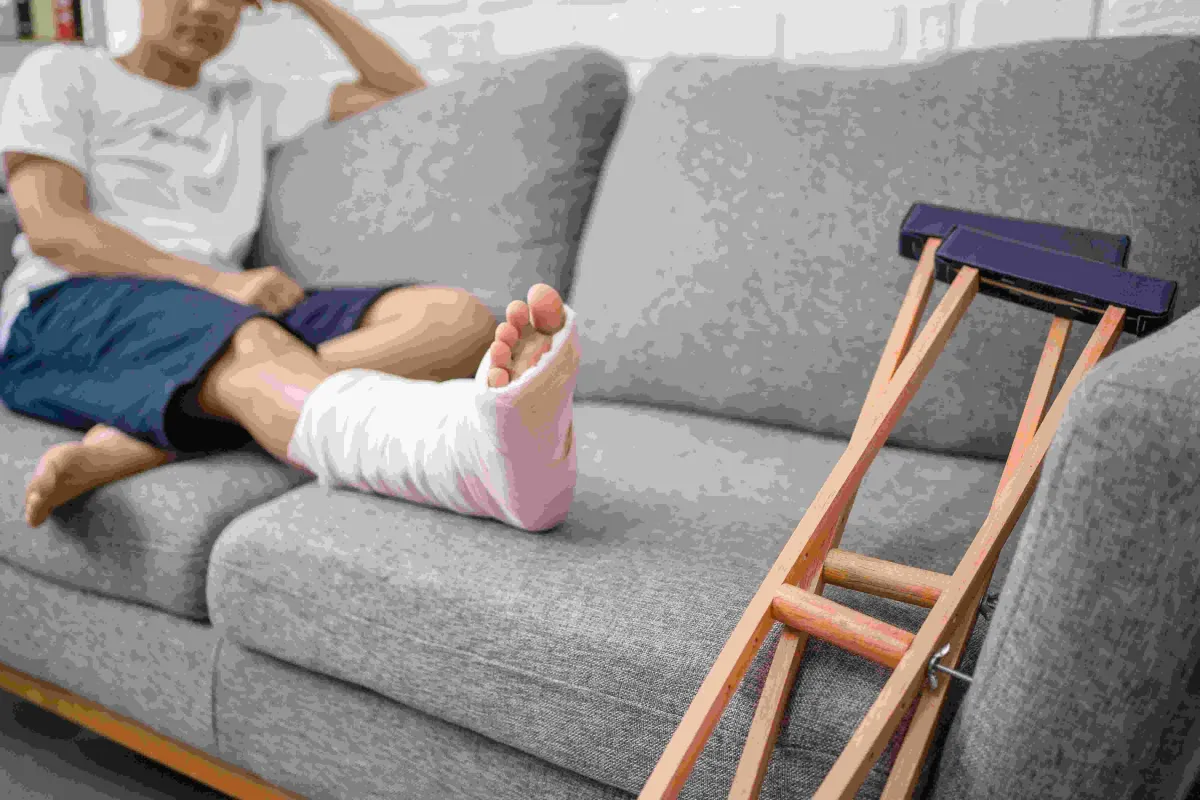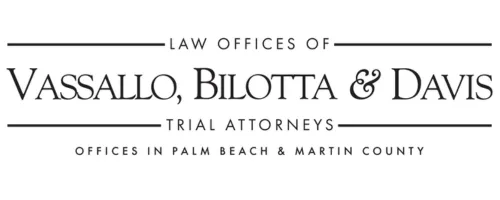DISABILITY BENEFITS BY A WEST PALM BEACH WORKERS COMP LAWYER
Workers Compensation Disability Attorney

What is workers compensation disability and how does it work? Disability is defined as an inability to work. An injured worker is entitled to disability benefits when the injured worker has restrictions or limitations that prevent the worker from performing his/her pre-injury job duties.
Disability Benefits, often referred to as indemnity benefits, are important benefits provided by workers’ compensation. Determining what benefits the injured worker is entitled to isn’t always easy. Often times, an injured worker is required to complete and submit Employee Earnings Reports (EER forms). These forms can be overwhelming to fill out, especially when you’re injured and in pain.
They must be filled out accurately and correctly or there’s a risk of losing all benefits.
If you need help completing these forms, our workers compensation attorneys at Vassallo, Bilotta and Davis can help you pursue and secure the benefits you need.
Florida Workers Compensation Disability Benefits
There are a few types of disability benefits available through workers’ compensation in Florida:
Temporary Partial Disability (TPD): These lost wage benefits are paid when you have suffered a work injury that results in restrictions and you’re unable to earn at least 80% of your pre-injury wages. For example, a construction worker may be eligible for temporary partial disability if he or she is unable to work in the same position or may only be able to work part-time because of the physical limitations caused by the work accident and injury. There must be a loss of income to receive TPD benefits. If your employer offers you work within your restrictions, even if it’s not the same job or position, you should at the very least make an attempt to work within those restrictions, in order to qualify for TPD benefits. If your employer does not offer you work within your restrictions, you should receive TPD benefits.
Temporary Total Disability (TTD): These lost wage benefits are paid to you when you have suffered an injury that prevents you from working at all. If the authorized workers’ compensation physician places you on a “no work” status, you are eligible for and should be receiving TTD benefits. You are only eligible for TTD benefits when the authorized doctor says you are unable to work. If you have sedentary or light duty restrictions and your employer does not have work available for you, you will receive TPD benefits and not TTD benefits. TTD benefits are only owed when the doctor says you cannot work.
Permanent Total Disability (PTD): These lost wage benefits are paid once you have reached Maximum Medical Improvement (MMI) and if your work injury and resulting disability and condition prohibits you from returning to sedentary work within a 50 mile radius. These benefits are not the same as social security disability and you are able to receive social security disability and permanent total disability at the same time - although an offset will likely apply.
Impairment Benefits (IBs): Impairment benefits or permanent partial disability beneifts are paid to you when you have suffered a permanent partial disability and have been assigned a permanent impairment rating (PIR) by your authorized doctor. If you are not earning less than your Average Weekly Wage (AWW), the employer/carrier must pay impairment benefits at 75% of your compensation rate or TTD rate. If you are earning at least the amount of your AWW, this amount will reduce by 50%. For every percentage of impairment to your body as a whole, you will be entitled to 2 weeks of benefits for each percentage point of impairment from 1 percent up to and including 10 percent, 3 weeks of benefits for each percentage point of impairment from 11 percent up to and including 15 percent, 4 weeks of benefits for each percentage point of impairment from 16 percent up to and including 20 percent, and 6 weeks of benefits for each percentage point of impairment from 21 percent and higher. These benefits do not mean that your case is settled.
Determining what category of disability benefits you qualify for is an important first step in the workers’ compensation process. You may qualify for one or all of these work comp indemnity benefits at different stages in your case. Medical opinions will determine the type of lost wage benefits that you are entitled to. If you are unsure about what benefits you qualify for or how to make a claim, a West Palm Beach workers’ compensation attorney at Vassallo, Bilotta and Davis Law Firm can help.
A West Palm Beach Workers’ Compensation Lawyer Can Help You Apply For Workers Compensation Disability
If you’ve been injured on the job, report the accident and injury to your employer. Ideally, this should be in writing so you can prove you notified your employer within 30 days of the accident date. This will allow documentation of the work accident by both the employer and the injured worker.
If the employer does not notify the work comp insurance carrier, a text or email will make it easier to prove that you
had a work accident and gave timely notice. Claims can be filed with the Florida Division of Workers’ Compensation.
Workers’ Compensation attorneys work on contingency so it is often advantageous to hire an attorney to assist with your
claims and pursuit of benefits. The attorneys at Vassallo, Bilotta and Davis can help make sure your claims are filed and benefits are secured. We are a West Palm Beach workers’ compensation law firm that can help. If you’re not sure of or are not receiving the benefits you deserve, you should speak with an attorney as soon as possible.
Who is Eligible for Worker’s Compensation Disability Benefits in Florida?
Any employee who has had an accident and suffered an injury arising out of work performed in the course and the scope of employment. The injury can be a result of repetitive trauma or occupational disease. For the injury to be compensable, it must be proven by medical evidence that the work accident was the major contributing cause of any resulting injuries. Major contributing cause (MCC) means the cause of the work injury is more than 50 % responsible for the injury as compared to all other causes combined. The accident and injury must be reported within 30 days of the date of accident.

An employee includes any person who receives compensation from an employer for work performed even if the employer has employed the employee unlawfully. An employee does not include independent contractors. However, just because the employer may indicate that you are an independent contractor, it does not mean that you meet the legal definition of independent contractor. There are several factors to apply before determining whether an independent contractor is actually an employee for workers’ compensation coverage. Employers may try to argue that an employee is not covered under workers’ comp simply because they get paid via a 1099. This issue often arises in the construction industry. Employees that work as roofers, dry wall framers, painters, landscapers, and/or truck drivers are sometimes labeled as independent contractors when in actuality, they are employees under the work comp law. These cases are very fact intensive and an experienced workers’ compensation attorney can help get the benefits you deserve.
Repetitive trauma claims are often denied by the employer/carrier since there is no immediate accident. However, injuries occurring over time while using repetitive motions on the job, like lifting objects over and over again can be covered under work comp and considered a compensable injury. Even pre-existing injuries can be compensable injuries if a work accident aggravated or exacerbated the pre-existing condition. Prior back injuries, shoulder injuries, hip injuries, and/or knee injuries can all be related to a work accident if the work accident made your condition and pain worse. Even if the employer/carrier argues that your knee injury or your back injury was due to a prior unrelated event, an experienced work compensation attorney can help secure you the benefits you deserve.
Proving that that your injury or occupational disease occurred while you were on the job can sometimes be difficult. In some cases, it may be obvious because the injury was witnessed by your co-worker or employer. However, in other cases, it could be more difficult if there were no witnesses or you did not report the accident and injury on the date of accident or you did not request medical treatment on the date of accident. However, this does not mean you are not entitled to workers’ compensation benefits.
Workers’ compensation is a no fault system so even if it was the injured worker’s fault, the injured worker is entitled to benefits. If an employee was injured in a car accident while on the job, the accident and injury should be covered by workers’ compensation. The injured worker may also have a third party claim against the at fault driver of the motor vehicle as well. Car accidents that occur on the job are sometimes denied based on the “going-and-coming rule”. Depending on the facts of your case, you may or may not be covered under workers’ compensation law. An employee who is required to travel for work and suffers an injury while traveling is eligible for workers comp benefits. However, these claims are often disputed when the traveling employee is out of town and an injury is sustained while deviating from employment duties.
An experienced workers’ compensation attorney can help evaluate the claim and pursue benefits you may be entitled to. Determining the benefits you may qualify for can be difficult and the process can be long and complicated. A West Palm Beach workers’ compensation lawyer can help you successfully navigate the process so that you can get the benefits you need.
Contact a West Palm Beach Workers’ Compensation Attorney at Vassallo, Bilotta and Davis
At Vassallo, Bilotta and Davis Law Firm, we help injured workers get the benefits they deserve. If you have questions about or need assistance securing the work comp benefits that you are entitled to, we can help. We’ve been helping injured workers since 1978. To schedule a free consultation, call us at 561-471-2800 or contact us online to discuss your case with an experienced West Palm Beach workers’ compensation lawyer today.
